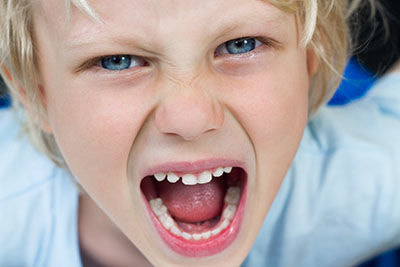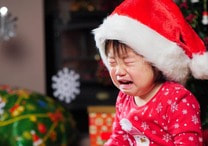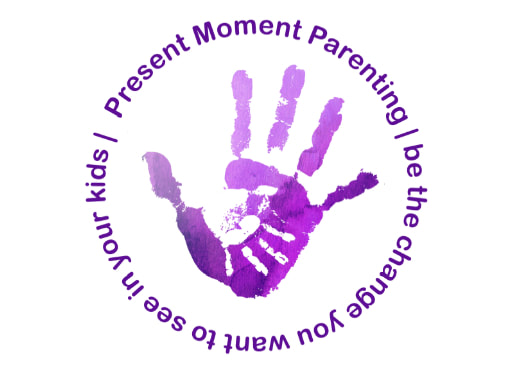| Welcome back to Present Moment Parenting. I am your host, Mia Von Scha, and today we will be talking about toddlers who bite and what to do with the biter and the child who has been bitten without turning this into a bullies and victims scenario. The email I received this week is from a teacher who runs a regular playgroup for moms and toddlers. This is what she said: |
Transcript of podcast...
There is a child who regularly attends one of my weekly playgroup sessions and who bites or attempts to bite other children in the group. Unfortunately he was successful 3 weeks ago when a new mom came to try out the group with her toddler. The new mom took is really well but I am concerned because it was not a once off and the mom then made him apologise to the girl he bit and promise never to do that again. I can see that the forcing to apologise is fruitless, because it keeps happening.
This was the scenario of the successful biting incident...
Kid A and Kid B both wanted the wagon. They both had their hands on the handle. There was some arguing between them. Then, before we knew it, Kid B had bent his head down and opened his mouth wide and was biting Kid A's hand. We separated them, but Kid A was left with teeth marks on her hand!
So here is my question:
What should the following people do in a situation when a child has bitten another child (or attempted to)? I get that prevention is better than cure but in the biting case at the playgroup, it happened so fast even though the moms were nearby. Since then, I pay much closer attention to this child. What should the mom of Kid B do? What should mom of the bitten kid do? What should the rest of us do? I don't want the mom to force the kid to apologise. I want the kid who was bitten to feel safe again and know that we are not ok with that. The advice I got was to say "Biting hurts". What do you think?
I would like to add that this child is generally a bit "violent" (for want of a better word) – he has in the past also chased another child with a toy spade, hit another child on the head with a stick, and regularly pinches other children too. So almost every playgroup I find there is an act like this.
Firstly let me say that everyone in this situation handled it as best as they could. Dealing with children’s interactions is a learning experience for everyone and as we, and our toddlers, navigate our way through these scenarios we learn skills that will be useful to us for the rest of our lives.
It is never nice to see your child, or a child in your group, getting hurt. It’s also not nice for the child doing the hurting and the parent of this child. Please be assured that most children go through a phase of hitting, biting, scratching, pinching or otherwise hurting those around them. It is normal for our kids to experiment with all kinds of emotions and behaviour, and it is our job to help them to get to the other side of this with as little harm done as is possible.
The rule to keep in mind is that all emotions are acceptable while some behaviours may need to be limited. Children bite for many reasons – they could be teething, or frustrated, testing limits, seeking attention or just exploring the world with their mouths as they tend to do in this oral phase of development. In most situations I would first assume teething and offer the child something else to bite. Keep your playgroup stocked with teething rings or other appropriate, safe toys that can handle some chewing.
In this case, however, as you mentioned, this little boy is acting out in other ways besides just the biting. You’re doing the right thing by keeping a closer eye on him. He will need to be shadowed until he has either passed this phase or learned better coping skills. I think of this as being the external prefrontal cortex for a child. Our prefrontal cortex keeps our emotions and behaviour in check. It’s the part of the brain that stops us from beating people over the head or taking a chunk out of their hands with our teeth. Be honest, we all get that urge sometimes. It’s a marvel of evolution, allowing us to behave in civilised ways that go against our deeper instincts. And this part of the brain is only fully developed in our early twenties. So it’s no wonder that toddlers struggle to keep their wilder instincts in check.
Part of our job as parents and educators is to offer this control for our children when they are unable to do it for themselves. So keep a calm, watchful eye on this little chap and make sure you are close enough to intervene if necessary. This takes a lot of presence, as these things do happen so quickly. The minute you see him going in for the bite, get your hand between him and his prey and firmly, but gently let him know that this is not ok.
You can say something like:
“It looks like you want to bite Jenny. I won’t let you do that.”
You can ask him what else he can do instead or offer him something else to bite on.
Ideally the children need assistance with this situation before it gets to this point. Usually if two children are struggling over a toy, I would let it play out and allow them to resolve the issue themselves. However, always move closer to children who are engaged in any kind of conflict in case you might be needed. You can do what Magda Gerber would call ‘sportscasting’ and comment on the action:
“Jenny, you really want to play with that wagon. Tommy, you want to play with the wagon too. You are both holding on tight…”
If they don’t seem to be resolving it, you can also offer alternatives, such as “Jenny, I have another wagon here, would you like to play with this one?”
They key to knowing when to actually intervene relies on you knowing the children involved and what their general ability is to tolerate frustration. Some children will keep at it until it’s resolved, some will give in at the slightest challenge, others will cry and others will bite. And this is not to label children as passive or aggressive or anything. They are learning how to resolve social issues and may on different days try out different strategies. If we leave them then the more passive child will eventually have enough and put his foot down, and the seemingly aggressive child will learn empathy. This is why I don’t want them labelled as bullies or victims. Labels tend to stick and then become self-fulfilling prophecies. We want to intervene as little as possible, but we must step in if someone is going to get hurt. Knowing when and how to do this is an art and you will get better at it with practice.
If he does slip a bite in when you’re not looking… and let’s be honest, you can’t keep on top of one child constantly particularly when you have a group of little ones to take care of… So if he does get a bite in, ideally we want everyone involved to under-react. I know that sounds counterproductive when you’re trying to give the message to both the biter and the bitten child that this is not ok. But if we overreact we give the child who is biting a strong reaction that he may not understand and may need to repeat the behaviour to try to get a grip on this. We also give the bitten child the sense of being a victim and this can become a reinforced way of getting attention.
So calmly, but firmly, let Kid B know “I can’t let you bite other children. Biting hurts.”
You can even point out how the other child is responding to his action. “Jenny is crying now. Her hand hurts.”
Be careful not to fill your tone with blame and judgement. It isn’t his fault that his prefrontal cortex is not yet developed. He needs help with his behaviour. Guilt leads to more bad feelings which leads to more behavioural issues in the long run.
To Kid A you can say, “Tommy bit your hand. Was that sore? I wonder if you also got a fright?” Be available if she needs a hug or some additional comfort but don’t overly coddle her. First watch and see what she does.
I would never expect a child to apologise. This is insincere and also gives the impression that as long as we apologise afterwards we can keep at this behaviour. It also implies blame and guilt, and as we have discussed, he is not a bad kid. He’s just an underdeveloped one who hasn’t had all the help he needs in directing his behaviour. He may also be an unhappy child – from what you have said he certainly seems to be struggling at the moment. Does he have a new sibling or has there been some other major change in his life recently? He could be trying to work through many difficult emotions and needs an outlet for his anger and frustration. We can’t blame him for not knowing how to behave if we haven’t either modelled these skills for him or directed him to more appropriate ways to express himself. He will learn how to behave appropriately eventually. And he will learn how to apologise by seeing the adults in his life doing it, and by the natural empathy that develops when children are treated with kindness and respect. Give him time.
As for the mothers of the two children, the best way to teach anyone anything is to model the behaviour for them. As the leader of this group, feel confident to take the lead and intervene and speak to the children in a way that shows calm control and respect for everyone involved. By observing you they will also learn that there are other way to deal with these situations. If you feel comfortable discussing it with them afterwards you can explain your reasons for behaving as you did and for not expecting an apology.
Good luck. It is a challenging situation, but all your lives will be enriched for having gone through it. Thank you for sending in your question, and for running a respectful playgroup. Please continue to do your wonderful work in the world.
If you have any further questions please feel free to email them to me at [email protected] or connect with me through my Facebook group, Present Moment Parenting.
There is a child who regularly attends one of my weekly playgroup sessions and who bites or attempts to bite other children in the group. Unfortunately he was successful 3 weeks ago when a new mom came to try out the group with her toddler. The new mom took is really well but I am concerned because it was not a once off and the mom then made him apologise to the girl he bit and promise never to do that again. I can see that the forcing to apologise is fruitless, because it keeps happening.
This was the scenario of the successful biting incident...
Kid A and Kid B both wanted the wagon. They both had their hands on the handle. There was some arguing between them. Then, before we knew it, Kid B had bent his head down and opened his mouth wide and was biting Kid A's hand. We separated them, but Kid A was left with teeth marks on her hand!
So here is my question:
What should the following people do in a situation when a child has bitten another child (or attempted to)? I get that prevention is better than cure but in the biting case at the playgroup, it happened so fast even though the moms were nearby. Since then, I pay much closer attention to this child. What should the mom of Kid B do? What should mom of the bitten kid do? What should the rest of us do? I don't want the mom to force the kid to apologise. I want the kid who was bitten to feel safe again and know that we are not ok with that. The advice I got was to say "Biting hurts". What do you think?
I would like to add that this child is generally a bit "violent" (for want of a better word) – he has in the past also chased another child with a toy spade, hit another child on the head with a stick, and regularly pinches other children too. So almost every playgroup I find there is an act like this.
Firstly let me say that everyone in this situation handled it as best as they could. Dealing with children’s interactions is a learning experience for everyone and as we, and our toddlers, navigate our way through these scenarios we learn skills that will be useful to us for the rest of our lives.
It is never nice to see your child, or a child in your group, getting hurt. It’s also not nice for the child doing the hurting and the parent of this child. Please be assured that most children go through a phase of hitting, biting, scratching, pinching or otherwise hurting those around them. It is normal for our kids to experiment with all kinds of emotions and behaviour, and it is our job to help them to get to the other side of this with as little harm done as is possible.
The rule to keep in mind is that all emotions are acceptable while some behaviours may need to be limited. Children bite for many reasons – they could be teething, or frustrated, testing limits, seeking attention or just exploring the world with their mouths as they tend to do in this oral phase of development. In most situations I would first assume teething and offer the child something else to bite. Keep your playgroup stocked with teething rings or other appropriate, safe toys that can handle some chewing.
In this case, however, as you mentioned, this little boy is acting out in other ways besides just the biting. You’re doing the right thing by keeping a closer eye on him. He will need to be shadowed until he has either passed this phase or learned better coping skills. I think of this as being the external prefrontal cortex for a child. Our prefrontal cortex keeps our emotions and behaviour in check. It’s the part of the brain that stops us from beating people over the head or taking a chunk out of their hands with our teeth. Be honest, we all get that urge sometimes. It’s a marvel of evolution, allowing us to behave in civilised ways that go against our deeper instincts. And this part of the brain is only fully developed in our early twenties. So it’s no wonder that toddlers struggle to keep their wilder instincts in check.
Part of our job as parents and educators is to offer this control for our children when they are unable to do it for themselves. So keep a calm, watchful eye on this little chap and make sure you are close enough to intervene if necessary. This takes a lot of presence, as these things do happen so quickly. The minute you see him going in for the bite, get your hand between him and his prey and firmly, but gently let him know that this is not ok.
You can say something like:
“It looks like you want to bite Jenny. I won’t let you do that.”
You can ask him what else he can do instead or offer him something else to bite on.
Ideally the children need assistance with this situation before it gets to this point. Usually if two children are struggling over a toy, I would let it play out and allow them to resolve the issue themselves. However, always move closer to children who are engaged in any kind of conflict in case you might be needed. You can do what Magda Gerber would call ‘sportscasting’ and comment on the action:
“Jenny, you really want to play with that wagon. Tommy, you want to play with the wagon too. You are both holding on tight…”
If they don’t seem to be resolving it, you can also offer alternatives, such as “Jenny, I have another wagon here, would you like to play with this one?”
They key to knowing when to actually intervene relies on you knowing the children involved and what their general ability is to tolerate frustration. Some children will keep at it until it’s resolved, some will give in at the slightest challenge, others will cry and others will bite. And this is not to label children as passive or aggressive or anything. They are learning how to resolve social issues and may on different days try out different strategies. If we leave them then the more passive child will eventually have enough and put his foot down, and the seemingly aggressive child will learn empathy. This is why I don’t want them labelled as bullies or victims. Labels tend to stick and then become self-fulfilling prophecies. We want to intervene as little as possible, but we must step in if someone is going to get hurt. Knowing when and how to do this is an art and you will get better at it with practice.
If he does slip a bite in when you’re not looking… and let’s be honest, you can’t keep on top of one child constantly particularly when you have a group of little ones to take care of… So if he does get a bite in, ideally we want everyone involved to under-react. I know that sounds counterproductive when you’re trying to give the message to both the biter and the bitten child that this is not ok. But if we overreact we give the child who is biting a strong reaction that he may not understand and may need to repeat the behaviour to try to get a grip on this. We also give the bitten child the sense of being a victim and this can become a reinforced way of getting attention.
So calmly, but firmly, let Kid B know “I can’t let you bite other children. Biting hurts.”
You can even point out how the other child is responding to his action. “Jenny is crying now. Her hand hurts.”
Be careful not to fill your tone with blame and judgement. It isn’t his fault that his prefrontal cortex is not yet developed. He needs help with his behaviour. Guilt leads to more bad feelings which leads to more behavioural issues in the long run.
To Kid A you can say, “Tommy bit your hand. Was that sore? I wonder if you also got a fright?” Be available if she needs a hug or some additional comfort but don’t overly coddle her. First watch and see what she does.
I would never expect a child to apologise. This is insincere and also gives the impression that as long as we apologise afterwards we can keep at this behaviour. It also implies blame and guilt, and as we have discussed, he is not a bad kid. He’s just an underdeveloped one who hasn’t had all the help he needs in directing his behaviour. He may also be an unhappy child – from what you have said he certainly seems to be struggling at the moment. Does he have a new sibling or has there been some other major change in his life recently? He could be trying to work through many difficult emotions and needs an outlet for his anger and frustration. We can’t blame him for not knowing how to behave if we haven’t either modelled these skills for him or directed him to more appropriate ways to express himself. He will learn how to behave appropriately eventually. And he will learn how to apologise by seeing the adults in his life doing it, and by the natural empathy that develops when children are treated with kindness and respect. Give him time.
As for the mothers of the two children, the best way to teach anyone anything is to model the behaviour for them. As the leader of this group, feel confident to take the lead and intervene and speak to the children in a way that shows calm control and respect for everyone involved. By observing you they will also learn that there are other way to deal with these situations. If you feel comfortable discussing it with them afterwards you can explain your reasons for behaving as you did and for not expecting an apology.
Good luck. It is a challenging situation, but all your lives will be enriched for having gone through it. Thank you for sending in your question, and for running a respectful playgroup. Please continue to do your wonderful work in the world.
If you have any further questions please feel free to email them to me at [email protected] or connect with me through my Facebook group, Present Moment Parenting.
Related posts...





 RSS Feed
RSS Feed